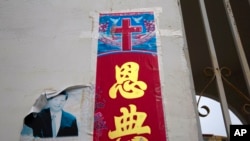China’s new and sweeping Patriotic Education Law, which targets all types of education including religious teaching, officially went into effect on January 1. Church leaders say they are already struggling to adapt to the new guidelines.
State media have said the Patriotic Education Law aims to target all levels of society, including schools, churches and international institutions.
According to the law, the Chinese government encourages religious groups, schools and places of religious activities to conduct patriotic education, aiming to strengthen national awareness among clergy and believers and guide religions to align with socialist society.
Late last month, on Christmas Eve, China's top political adviser, Wang Huning, delivered a stern message to Christian leaders, urging "strict" management of religious affairs and unwavering allegiance to the Communist Party's vision for Christianity.
Wang outlined a clear vision for the future of Christianity in China, insisting that religious leaders must "adhere to the direction of Sinicization of Christianity."
Churches already are raising questions and concerns about how they will comply with the new law.
Some churches are being cautious
In its bid to comply, U.S.-based Christian rights group China Aid said that one Christian church in the northeastern city of Shenyang, Liaoning Province, changed its Sunday worship activities from performing gospel songs to performing patriotic songs and dances and telling patriotic stories of the Chinese Red Army's Long March during the Chinese Civil War.
Pastor Guan, who has worked in the southern city Guangzhou for many years, told VOA that he and his believers have always supported the rule of the Communist Party and love China because they believe this is God's arrangement. What they object to is the party's request that they preach false doctrines that are not in line with the Bible. Guan requested that only his surname be used for security reasons.
Guan was expelled from Guangzhou last summer and can live only in another city in Guangdong Province to continue his preaching work.
"We live under Chinese laws and regulations. We have not committed any crime. Our 'sin' is not following the Sinicization of Christianity and not sacrificing faith to safeguard the leadership of the Communist Party," Guan said.
Last month, the Ethnic and Religious Affairs Bureau of Guangzhou released a video on how to report illegal religious activities and said those who provide clues and assist in investigating unlawful religious organizers could receive rewards up to 10,000 yuan, roughly $1,400.
The local official Catholic churches in Henan Province have explicitly prohibited young people under 18 from entering churches to participate in Mass and priests from hosting activities such as youth training classes and summer and winter camps.
Officials would impose heavy fines of up to 838,000 yuan, roughly $117,700, on those who hold Sunday school, according to the Christian Post, an online news site based in the United States.
Harassment and jailing
Pastor Mu began preaching in Beijing more than 20 years ago, through family gatherings. He and his church have been unwilling to register under the government’s Three-Self Patriotic Movement, which supervises Protestant churches. Mu asked that only his surname be used for security concerns.
Mu has been under government surveillance for more than 20 years. The church he worked for had to move several times due to harassment by the authorities. He told VOA that some of his church colleagues were recently arrested by authorities and are still in jail.
Chienyu Shih, a researcher at Taiwan's Society of Central Asian Studies, said Chinese leader Xi Jinping has always viewed Christianity as a tool used by foreign countries to influence China.
"They believe that Christianity is the spokesperson of European and American countries,” Shih said. “Through Christianity, European and American ideas, whether social values or political views, arouse reactions from the Chinese people and even generate dissatisfaction and resistance among the common people toward the Communist Party, which is not what they want.
“Therefore, they must cut off Chinese people's foreign connections through the Sinicization of religion."
Shih said the Chinese Communist government has made so many big moves against Christianity mainly because it has no confidence in itself and is worried that other countries will use religion to challenge its legitimacy. He said the party's control over religion is bound to become tighter this year.




